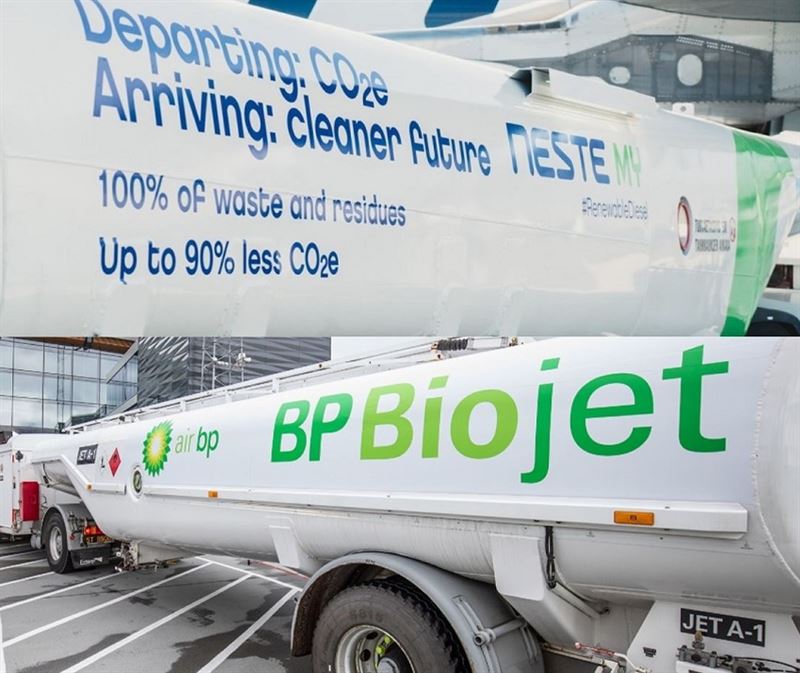At a time when ecological issues are being brought to the forefront, aviation and business aviation are being singled out. Indeed, aviation represents 3% of CO2 emissions worldwide. Similarly, between 2005 and 2019, business aviation would have seen its CO2 emissions increase by 31%. However, concerned about the environment, the aviation market is increasingly adopting biofuels to limit their environmental impact. But what are they? How can business aviation set the trend for more sustainable aviation? AEROAFFAIRES gives you an update on the situation.
What are biofuels (SAF)?
Biofuels, also known as Sustainable Aviation Fuels (SAF), are a sustainable alternative to jet fuel. They are created from organic, non-fossil, often vegetable matter. They can be made from agricultural waste, for example, or from plants such as sunflowers, but also from forestry residues.
While the European Union affirms its wish to reach zero emission of C02 by 2050, the carbon neutrality will pass in particular by the use of biofuels. If in 2019, the use of biofuels was only 0.1% in the aviation sector, the French government plans to increase the rate. Indeed, in 2022, it plans to increase this rate to 1%, then 2% by the year 2025 and finally reach 5% in 2030.
To date, the use of biofuels can be done by coupling it with 50% of conventional kerosene. However, aircraft engines are manufactured to be able to receive 100% biofuels.
Thus, the use of biofuels would allow a significant reduction of nearly 80% of C02 emissions from aviation.
Business aviation: a lever for a more sustainable aviation

It should be noted that the cost of biofuels is higher than the kerosene used as a base. This is an obstacle for large commercial airlines because their aircraft are larger and consume more kerosene. However, for small private jets, the price difference is less and especially less impactful in the business aviation sector.
Moreover, biofuels are not yet produced enough to cover all aviation needs. However, it tends to develop more and more rapidly because the demands are great.
Moreover, we know that the health crisis has brought ecological issues to the forefront. Indeed, during the year when commercial airlines were blocked, CO2 emissions decreased. At the same time, business aviation has been democratized to compensate for the lack of supply from commercial airlines. The adoption of biofuels is therefore crucial in the on-demand aviation sector. As it is easier to implement this mode of consumption, there is no doubt that business aviation will be a lever for a more responsible aviation.
Business aviation projects to limit pollution
In France for example, only Paris Le Bourget and Clermont Ferrand airports are supplied with biofuels, but other airports will also be equipped during the year.
However, in addition to biofuels, other actions are planned. For many, these projects highlight the use of hydrogen as a replacement for traditional fuel. This solution is the most sustainable one, but it is still in the planning stage. Airbus plans to release hydrogen-powered aircraft in 2035. We will have to wait a few more years.
On the other hand, we are also seeing the emergence of electric aircraft projects such as the Volocopter, the CityAirBus or the 100% electric Alice private jet. Likewise, these projects are emerging but are still too few to be used and put into service in business aviation. The simplest and most immediate solution is to use biofuels, which have already been introduced.
Biofuels alone will represent nearly 50% of the path to carbon neutrality by 2050, compared to 35% for new technologies. They are not a technological challenge. Current aircraft are already certified to use 50% sustainable fuels. However, we need to accelerate the development of the production chain.
Bruno Even, CEO of Airbus Helicopters, said.
At AEROAFFAIRES, we are concerned about the environment, and are working with partners and biodiversity projects. We have also created our Sky C02 program, which offsets the carbon emissions of all our flights by supporting a deforestation project.
Our team is available 24/7, including weekends and holidays. We respond quickly to your request for a quote online or by phone at +33 1 44 09 91 82.


